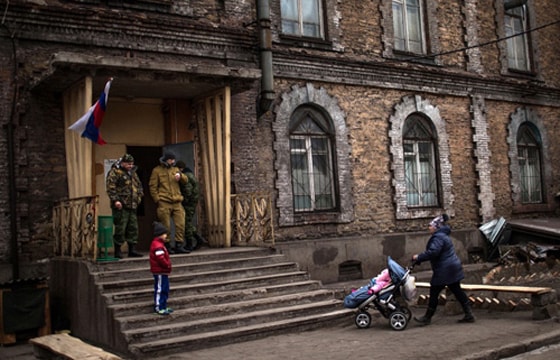Ukraine Ceasefire: Indefinite Break
(Baonghean) - On Tuesday, December 9, a ceasefire agreement was signed between the Kiev government and pro-Russian separatist rebels. So far, this agreement is still being adhered to by both sides, however, this does not seem to be the final end to the 8-month-long conflict in the East of this country.
 |
| Eastern Ukraine on a day without gunfire. |
| RELATED NEWS |
|---|
Looking back at the political negotiations between the two parties directly involved in the conflict, which began with an agreement signed on September 5 in Minsk, it can be seen that the state of limbo has been prolonged without any significant progress. The rebels have taken control of the territory in the east of the country, stretching from the city of Donetsk to the Ukrainian-Russian border, in the Luhansk region. The administrative apparatus here is organized in the form of the self-proclaimed "Democratic Republics" of Donetsk and Luhansk. On November 2, the separatist leaders were elected by the population as political representatives. Local figures replaced the positions of Russian political representatives - who headed these regions during the first phase of the civil war (from spring to August 2014).
This period ended with the defeat of the Ukrainian Army, after the rebels received aid from Russia. The flow of weapons and military equipment was transferred by the Moscow government to Eastern Ukraine through the border strip continuously controlled by the rebels. Notably, on this border there are two checkpoints where 142 OSCE observers are present - responsible for monitoring and ensuring compliance with the ceasefire. However, fighting still takes place between the Ukrainian Army and the opposition forces. The hot spot of the battlefield is Donetsk Airport and the surrounding area - under the control of Kiev. In addition, there is Debaltsevo in the east of the airport and Chastye in the south of the city of Lougansk. Since September 5, about 1,000 civilians and soldiers have been killed. General statistics of the United Nations give a casualty figure of 4,300 people since the beginning of the civil war.
The Minsk ceasefire agreement in September was the basis for the general negotiations between all parties involved. Among the 12 agreements were an agreement to exchange prisoners, and Russia to withdraw its troops and military equipment from Ukrainian territory, handing over control of the border between the two countries to the Kiev government. In practice, however, these agreements have been only partially observed. Almost immediately, the ceasefire agreement was broken. Other ceasefires have been signed since, to the hope and disappointment of the international community. The moments when the situation calms down seem to occur only before important diplomatic talks for Russia (the Eurasian Summit in October, the G20 in November).
Several meetings between the parties continued in Minsk, but without any significant results. In particular, the elections organized by the rebels seemed to have extinguished any hope of political negotiations by insisting on autonomy in the territories they occupied. In response, Kiev cut off all supplies to the region - a statement in response to the election results that Kiev never recognized. The only way back to the Minsk agreements is for the pro-Russian opposition to annul the election results, recognize the control of the Kiev government, and negotiate some form of autonomy, some degree of autonomy within the Ukrainian state. In addition, the two sides have never fully complied with the prisoner exchange agreement or established a 30-kilometer buffer zone separating the two warring forces.
Following this rather lackluster negotiation process, what do people hope for at a new negotiating table in Minsk? A consensus between the two sides on the issue of troop withdrawal and transfer to create conditions for a respected ceasefire. In addition, the separatists also requested negotiations on the issue of "lifting economic sanctions" on the area under their control. However, with the current situation of the negotiation table being delayed, hopes for a new step forward may need to be put aside, instead, hope for a factor that can encourage the parties to think, consider positively about sitting together and thoroughly resolving the dispute. Russia is the first name that comes to mind, as this country is considered to be the most responsible for the crisis in Ukraine. A series of sanctions against Russia have been issued by the European Union and the United States. Recently, the drop in oil prices has certainly had a negative impact on the country's already isolated economy.
On December 7, French President Francois Hollande announced: "Russian President Putin has pledged to make every effort to ensure that this ceasefire agreement is fully and completely observed." In return, France reiterated its opposition to Ukraine joining NATO - a desire expressed by the Kiev government. However, the international community seems to have little faith in this statement - considering that Russian President Vladimir Putin is an unpredictable figure. Before welcoming the French President, the Kremlin's iron man made a statement that was not very sympathetic to the West. In it, he accused the European Union and the United States of exploiting the Ukrainian revolution to fight against Russia. Thus, the crisis in this small country is not simply a civil war, but a confrontation between the two poles of the world. Therefore, it would not be surprising if Kiev and the separatists do not sit down at the negotiating table while the West and Russia have not yet begun to reconcile.
Thuc Anh
According to Le monde






